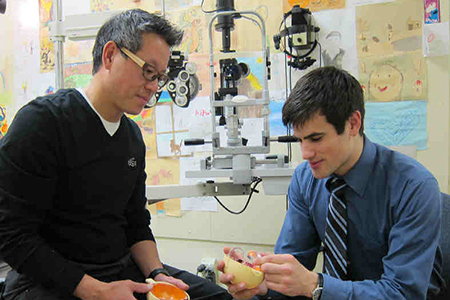The realm of engineering continues to explode into many fields in which new ideas are encouraged and needed. From saving our planet to exploring others students who pursue engineering all have a common goal: to make the world a better place by finding smart solutions. Whether your interests are oil and environmentalism or medicine and biomechanics consider an engineering degree.
“Engineering is not only a much needed profession in the world today but it’s also one of the coolest jobs with all its problem-solving emphasis on sustainability the environment infrastructure renewable energy and information and communications technology that a young person can ever have,” says E. Manos Maragakis, dean of the College of Engineering at the University of Nevada Reno.
Students who pursue engineering degrees will be well-equipped to take on the diverse range of issues that the world faces today. The principles of engineering can be applied to all parts of the field but as students narrow their areas of study specialized branches emerge including civil environmental computer science electrical mechanical chemical geological mining petroleum and aeronautical. Engineers are needed in almost every industry.
Preparing for Engineering in High School
You can begin to prepare for an engineering career in high school and it may not be as daunting as you think. A fundamental understanding of math and science is key and you should be at least at the pre-calculus and chemistry/physics level by the end of high school. But it’s not only the left side of the brain you’ll be exercising. Most people think that engineering requires strength in math and science since it’s primarily analytical. However English and writing skills are just as important as a means to communicate professionally.
“[Students] should take as much math and science (chemistry and physics) as they can,” says Ryan Smith, recruiting coordinator at the University of Alaska Fairbanks. “[But] it is also important for students to do well in English classes.”
Venetia Petteway corporate relations client executive at Kettering University likewise states that critical thinking and proficient writing skills are needed to “effectively operate and share information among teams departments customers and partners.”
Another important part of preparation is inquiry adds Fred Driscoll professor at the Wentworth Institute of Technology. “Students should ask questions of family friends neighbors teachers and guidance counselors to learn more about the field … Look for opportunities to experience engineering as part of a class presentation program [or] employment.”
Just like other colleges engineering schools want to see a variety of experiences on your application such as dual enrollment (and hopefully some experience in an engineering class) AP courses and employment and volunteer opportunities. Many universities offer pre-college engineering programs in the summer so you can get an early taste of what’s to come.
Use your ingenuity while exploring engineering possibilities ideally before committing a large amount of time and money. “Search online to read about different projects that engineers work on. Look beyond mechanical electrical and civil engineering to learn about less common fields like industrial engineering chemical engineering materials engineering or agricultural engineering and if one of those is appealing learn more about the education needed,” suggests Rick Olson, associate professor of industrial and systems engineering at the University of San Diego.
Remember the more experience you have the better prepared you will be for your undergraduate studies. Another advantage of exploring these avenues is to see if engineering really is right for you.
College Engineering Classes
It’s important to choose the engineering specialization that fits you best. Fortunately most colleges allow students to wait until the end of their second year to decide on a major leaving the first two years open for general studies and to explore different types of engineering.
“In general two-thirds of any engineering program is devoted to the major course and one-third is devoted to math and general science courses. Major courses in all engineering programs are developed to provide students [with] strong foundations in fundamental engineering as well as to provide them with knowledge and experience in analytical computational and experimental methods and an ability to design and evaluate these approaches for use in a given situation,” says Hossein Rahemi, professor and chair of the Engineering and Technology Department at Vaughn College of Aeronautics and Technology.
Devdas Shetty, dean of the College of Engineering at Lawrence Technological University explains, “It is probably safe to say that regardless of the institution’s size [and other demographics] as engineering students move through the curriculum work tends to move toward smaller and smaller groups and team projects. Most programs in the senior year require a capstone project which is an engineering project done in a small team from concept to fabrication and testing.”
Engineering programs come in all flavors imaginable with one common thread: when you leave school you will be prepared for the workforce. Many schools even offer co-op programs during which students spend time in the industry. For example at Kettering students alternate every 12 weeks between school and work. Thesis projects are generally company projects so students not only graduate with job experience but they also know how their skills will apply to the real world.
Many engineering schools also offer 3/2 programs which are formal double-degree undergraduate programs run by two separate colleges or universities. In these programs students study for three years at one school followed by two years at the other school. The student is awarded two bachelor’s degrees at the end of the five-year period one from each school and generally of different types (B.A. and B.S.).
No matter what the area of specialization engineering graduates will have many industry choices to explore.
What to Expect After You Graduate
After graduating engineers have several options. They can continue their schooling and earn advanced degrees or for those who are ready to work straightaway the options are plentiful. “Regardless of the nature of any student’s study with engineering as a subset people will be good at what they love so prospective engineers should look into what makes their ‘bells ring’,” Shetty advises.
Olson says that most of their graduates do “end up in classical engineering jobs. Recent graduates are working as design engineers hardware engineers sales engineers [and] quality manufacturing engineers in hospitals as management engineers and as systems engineers.” Larry Jacobs associate dean of the College of Engineering at Georgia Tech adds, “New engineers should expect to focus on addressing society’s grand challenges such as developing new energy sources providing access to clean water or engineering better medicines.”
Students have “unlimited potential as to where they work,” according to Maragakis. “They work at local engineering companies national industries state and federal agencies and as consultants.”
The Need for Engineers
Because the U.S. economy has been in a recession picking a job that is still in demand is a smart move. Engineering jobs across the board can suffer when the economy does especially as companies cut costs. However the good news is that engineers have highly transferable skills and are prepared to compete globally. Additionally those with co-op or internship experience are more likely to be hired. “The current economy has slowed down employment opportunities … However graduates with engineering knowledge current with the industry and a mindset for challenges have an edge in obtaining employment,” says Rahemi.
The other good news is that “there will always be a need for engineers in the workforce. They are creative problem-solvers and as long as the world has problems to be solved and products that need to be developed designed tested and manufactured there will be a need for engineers,” according to Petteway.
Dana Grennier, Director of admission at Milwaukee School of Engineering points out that engineers touch every kind of technology including “the Internet computers airplanes,safe buildings and pacemakers. Engineers played a role in developing and creating each of those. The powerful part of engineering is you never know what idea will be next.” That leaves a lot of room for growth among industries!
Additionally, Maragakis explains, “More than 50 percent of current science and engineering professionals are approaching retirement. This trend will remove a huge number of highly trained workers from the job pool.” This means more job opportunities for the younger generations.
Current Trends in Engineering
Schools keep on top of what’s new and work with you to help you “understand and realize the ways in which the fields of engineering provide solutions to our most challenging issues of the day,” says Natacha DePaola, dean of Armour College of Engineering at Illinois Institute of Technology (IIT). “The exchange of ideas and research and the work of our interprofessional projects [team-based projects in which students work together to solve a real-world problem] provide students at IIT with a transformative foundation for any future career in engineering, the sciences and beyond.”
As we encounter ecological, medical and security issues, new types of engineers are needed. For example, environmental awareness and sustainability are just as important as they have been over the last few years. Engineers who experiment with fuel cells and hybrid technology continue to find rewarding work.
Chemical engineers are in high demand within the Department of Homeland Security to help protect us from chemical or biological attacks, according to Petteway. She also points out that alternative energy technology is another hot area in which engineers are needed to design largescale power plants that can produce and distribute energy in compliance with new environmental regulations.
In addition, younger mining and power engineers must replace the previous generation. Smith says that the mining shortage is “causing a 100 percent job placement rate, as well as high starting wages.”
As needs change, we see engineering transforming to meet them, using elements of different branches to create solutions. Right now, one of those specialties is mechatronics (or mechanical and electronics engineering).
Engineers in this field study the automatons that control advanced hybrid systems. They create anything from biomechanical robots (with complete exoskeletons!) to safety elements in vehicles, such as the computer systems hat control your brakes and airbags.
With the high level of demand and specialized skill required, engineering has one of the highest starting salaries for a four-year degree. While this is important, don’t let salary be the be-all-end-all factor.
“Engineering, as a degree field, will always have a place in our society as long as there are problems to solve, products to develop, systems to maintain, safety issues to enhance, and technology that is needed to make things bigger and better or smaller and faster,” says Petteway. “Engineering is a great career field for any student who has the aptitude to take on its challenges and love it.”
With a degree in engineering, you’ll be more than ready to tackle the next problem when it arises.
| Average Starting Salaries for Engineers by Degree | |||
| Engineering Major | Bachelor’s Offer Avg. | Masters Offer Avg. | Doctorate Offer Avg. |
| Aerospace/Aeronautics | $56,335 | $69,506 | $81,025 |
| Bio & Biomedical | $68,000 | $79,875 | n/a |
| Chemical | $65,403 | $66,289 | $90,730 |
| Civil | $51,793 | $49,149 | $59,000 |
| Computer | $61,017 | $78,500 | $108,333 |
| Electrical | $57,600 | $66,863 | $72,566 |
| Environmental | n/a | n/a | n/a |
| Materials | $54,310 | n/a | n/a |
| Mechanical | $58,749 | $64,852 | $76,566 |
| Nuclear | $58,266 | $59,167 | n/a |
Sarah S. Cox is a writer, editor and graphic designer in Northern Virginia.



